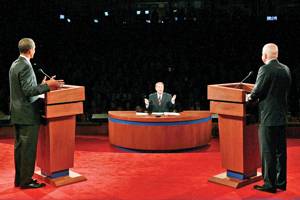ADAMS: Not a ‘game-changer’

ADAMS: Not a ‘game-changer’
September 27, 2008
After a few days on Capitol Hill, where the two presidential candidates attempted to fulfill their last remaining representative responsibilities — though one of the two will likely remain a senator well after Nov. 4 — Obama and McCain stepped up to the plate at the University of Mississippi for a Friday night debate.
After 97 minutes, however, the game was tied with no runs, hits or substantial errors and the American public was left with the impression of two potential presidents who have very little not in common.
Aside from their differences in demeanor — Obama overplaying the good sportsmanship card in saying “John, you’re absolutely right,” and McCain repeating “Senator Obama just doesn’t understand” — their differences on issues were left largely unspoken. Yes, Obama’s eyes were on McCain or the camera, as opposed to McCain’s looking at only the moderator, Jim Lehrer, or down, but the words that they delivered represented a great deal of common ground.
There were moments when true debate and heated exchange could have occurred, but very few were realized.
On the economy, the main point of contention was each senator’s tax plans. Obama focused on improving the economy through improving the middle class, promising tax cuts for those who make under $250,000. Asked to prioritize his goals to improve our present state, he offered a very concise list of energy independence based on alternative energy development, health care access for all, a science- and math-based education and affordable college, and an updated and improved infrastructure.
McCain, also asked to prioritize his economic goals, ignored his tax cuts for the rich and went straight to earmarks. He called earmarks a “gateway drug,” promising to veto every spending bill containing them and to name every congressperson requesting them. McCain referred to his record constantly, showing his priorities of veterans and defense when telling Lehrer that a spending freeze might be necessary when the next president enters office. This comment was left unpressed, however, leaving the public wondering.
The candidates’ foreign policy positions were largely akin as well. Obama predictably focused on his vote against the Use of Military Force resolution, while McCain focused on his push for the now-proven-successful surge in Iraq. One key difference that did emerge is that Obama seeks a set timetable to leave Iraq, while McCain only believes in pulling out troops after many conditions have been met.
Regarding nuclear threats, Russian aggressiveness and the future of Afghanistan and Pakistan, great differences were again lacking. The one area of disagreement which did receive many minutes of discussion was the candidates’ positions on negotiation. Obama, more diplomatically minded, said he would meet with a leader such as Iran’s Mahmoud Ahmadinejad after “preparations,” yet that “preconditions” — which he painted as obedience to a coercive U.S. — were not necessary if a meeting would protect U.S. safety. McCain disagreed, saying that preconditions would have to be met before he would even consider speaking with dictators such as Ahmadinejad, Raul Castro or Hugo Chavez. He specifically noted that speaking with Ahmadinejad would legitimize his claims against Israel’s existence.
The candidates also differed somewhat on the overall situation in the Middle East, as Obama called for a “broad strategic vision” of finishing off al-Qaida in Afghanistan while simultaneously restoring the U.S.’s international reputation. McCain, whom Obama charged with viewing the Middle East through the “sole lens of Iraq,” claimed that al-Qaida would return to Iraq as soon as the U.S. left and constantly referred to his experiences visiting the Middle East.
So who won?
Well, it all depends on who you ask. Fox News Channel viewers gave McCain the slight edge of 84-16, proving little else but that conservative viewers like having their opinions reinforced. To be fair, this is a simple trend of humans, as MSNBC viewers, trending Democratic, gave Obama a 52-34 edge. Looking at more central polls, however, CBS, CNN and NBC essentially reported a tie and a general belief from independents that either man could be the next American president.
Conclusively, then, the debate did little but reinforce the beliefs of those who have chosen their candidate and leave the undecided voters right where they were weeks or even months ago.
So was the debate useless? Not entirely, but basically, yes. A year of campaigning had already proven that these two men could publicly speak with skill. As George Will, a moderate voice of reason, wrote, “This wasn’t a game changer.” Another moderate, Dana Milbank, commented that “what came out [of their mouths] was neither hot nor cold, but a tepid gruel.”
Undecided Americans, however, need something more. Yes, our country will need bipartisan cooperation and compromise, but rather than tiptoe around their differences, both Obama and McCain need to show the American public why they would be a better president. In the end, that is all that this election, like all elections, is about.
This is now a winner-take-all competition between two men. A simple concept, but the candidates and moderator Lehrer seemed to have little concern for this fact. So then, with well over two weeks until debate No. 2, let’s hope that the candidates change their respective tunes, decide to honestly address their differences and go for the win. For as we all know, Americans do not like ties — our sports won’t accept them. And what’s more, our Constitution, which calls for one President of the United States, leaves no room for them.
— Steven Adams is a graduate student in political science from Annapolis, Maryland.






